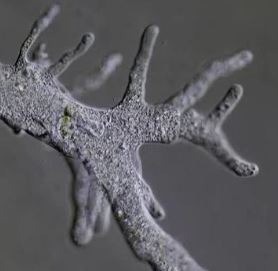Kerala on Edge: 69 Cases and 19 Deaths Linked to Rare Brain-Eating Amoeba Found in Freshwater Sources
Kerala is facing a health scare with 69 confirmed cases and 19 deaths caused by a rare and deadly brain-eating amoeba (Naegleria fowleri) that thrives in freshwater. Health authorities are on high alert, urging residents to take precautions as experts warn that the infection, though rare, can be fatal if not detected early.


Kerala, often hailed as God’s Own Country, is now battling an unexpected and deadly health challenge. The state has reported 69 confirmed cases of infection caused by the rare brain-eating amoeba, also known as Naegleria fowleri. Tragically, 19 people have already lost their lives, sparking widespread fear and pushing the health department into overdrive to contain the threat.
What is the Brain-Eating Amoeba?
Naegleria fowleri is a microscopic organism commonly found in warm freshwater lakes, rivers, and poorly maintained swimming pools. The amoeba does not spread through drinking water but enters the human body through the nose, usually when people swim, dive, or come into contact with contaminated water.
Once inside, the parasite travels to the brain, causing a rare but highly fatal condition known as Primary Amoebic Meningoencephalitis (PAM). Symptoms begin with headache, fever, nausea, and vomiting but quickly progress to seizures, hallucinations, and coma. Sadly, the disease is often fatal, with survival rates globally being extremely low.
How the Outbreak Started in Kerala
While isolated cases have been reported in India earlier, Kerala’s numbers are alarming because they represent a cluster outbreak. Health officials believe that the infections are linked to freshwater sources such as ponds, lakes, and small reservoirs where children and young adults often swim during the hot season.
Initial cases were treated as viral meningitis until lab tests confirmed the presence of Naegleria fowleri. By then, several patients had succumbed to the infection, raising concerns about possible underreporting of earlier deaths.
Current Situation: 69 Cases, 19 Deaths
According to the state health ministry, 69 people across different districts have tested positive, while 19 confirmed deaths have been reported so far. Many of the deceased were children and young adults who had recently swum in local ponds.
Hospitals are now on alert, with doctors instructed to closely monitor patients presenting with meningitis-like symptoms. The state has also issued guidelines to immediately begin anti-amoeba treatment if PAM is suspected, without waiting for lab confirmation.
Precautionary Measures for the Public
Health experts are advising residents to be extremely cautious while engaging in activities involving freshwater. Some key precautions include:
Avoid swimming or diving in ponds, lakes, and rivers, especially in areas with stagnant water.
Use nose clips if entering freshwater to reduce the chance of water entering nasal passages.
Ensure swimming pools are chlorinated and well-maintained.
Boil or filter water before using it for nasal rinsing or religious rituals.
Authorities have also appealed to the public not to panic, emphasizing that while infections are deadly, they remain rare. Simple precautions can significantly reduce the risk.
Why Kerala is Vulnerable
Kerala’s tropical climate, abundance of freshwater bodies, and heavy rainfall create favorable conditions for amoeba growth. Experts warn that rising global temperatures may make such infections more common, as warmer waters encourage microbial growth.
Moreover, the state’s cultural practices, which sometimes involve using freshwater in religious rituals and daily routines, could inadvertently increase exposure.
Government and Health Department Response
The Kerala government has swung into action with a multi-pronged strategy:
Rapid awareness campaigns across schools, colleges, and local communities.
Testing freshwater bodies in high-risk areas to detect contamination.
Dedicated hospital wards in major medical centers to isolate and treat suspected cases.
Training doctors and healthcare workers to identify symptoms early and initiate immediate treatment.
Health Minister Veena George has urged citizens to remain vigilant but calm, stating, “Kerala has faced many health challenges before, from Nipah virus to COVID-19. We will fight this too with science, awareness, and cooperation.”
Experts Call for More Research
While Naegleria infections are rare, the sudden spike in cases has raised urgent questions. Why is Kerala seeing such high numbers now? Could climate change and poor water management be playing a role? Scientists are calling for in-depth research into freshwater pathogens in India, warning that underreporting may be masking the true extent of the problem.
Some experts also stress the need for better diagnostic tools since PAM is often mistaken for bacterial or viral meningitis. Delayed diagnosis drastically reduces survival chances.
Global Context
Cases of Naegleria fowleri have been reported worldwide, including in the United States, Australia, and Pakistan. However, Kerala’s outbreak is one of the largest clusters seen in recent years. Globally, fewer than five people are reported to survive out of hundreds of cases recorded in the last decades.
This grim survival rate highlights why prevention is the best defense.
Conclusion: A Wake-Up Call for Public Health
The outbreak of the brain-eating amoeba in Kerala is not just a local tragedy but also a reminder of the growing threat of emerging infectious diseases in a changing climate. For families who have lost loved ones, the pain is immeasurable. For the state, it is a battle to prevent further deaths while educating millions about the risks hidden in everyday activities like swimming.
As Kerala continues its fight, the message is clear: vigilance, awareness, and science-based action are the strongest weapons against invisible killers like Naegleria fowleri.
Kerala on Edge: 69 Cases and 19 Deaths Linked to Rare Brain-Eating Amoeba Found in Freshwater Sources
By: Bharat Daily Samachar Date: 19 Sep,2025
